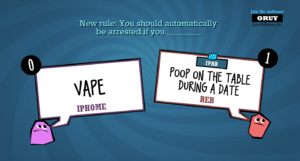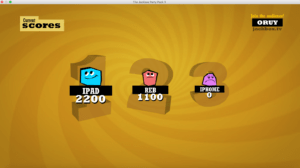For this assignment, I played Quiplash, made by Jackbox Games and purchased on the Steam platform. The theme of the game is humor/cleverness. Players come up with funny answers to prompts, which get pitted against other players’ answers and put up for vote. The objective is to outwit your competitors to gain votes and points. In the second round, point values are doubled, so it’s even better to outwit your opponents during this round.
There is a time limit when coming up with answers, so you have to think of interesting answers under pressure. An interesting mechanic is you can only see the next prompt once you submit your answer to the previous one, but the time limit is for answering all of the prompts. This forces the player to make on-the-spot decisions. For instance, should they submit a mediocre answer, or take more time to think about the answer but reduce the time left for the later prompts? It’s also good that Quiplash gives players an out if they can’t think of a good answer by means of the “safety quip” button. This allows the game to submit a random answer for them.

The type of fun this social game creates is fellowship. It also involves expression because players can type in whatever they want and express themselves through writing. The graphic design facilitates fellowship by attributing answers to the people who wrote them and showing who voted for what. When I play this game with a group, people always comment on who wrote and voted for what, sometimes expressing surprise or feigned annoyance. I also noticed that Quiplash uses a handwritten font to display people’s answers to the prompts (while the rest of the game/system uses more solid serif fonts). This lends a sketchiness to the answers, reflecting how the answers were generated through our own creativity and contributing to the fun of expression.

A key differentiation I see from other games that involve funny answers and judging is that Quiplash doesn’t provides answers for you to pick from. You have to completely generate the answers yourself, which allows for more expression. You can also learn more about the other players from their answers. As far as I know, Quiplash doesn’t seem to handle abuse. I think I’ve seen people enter curse words into their answers. Since the questions are not directed to be about anyone in particular, the answers will likely not attack someone in the group.
After each round, Quiplash displays the score board for everyone. I’m not a fan of how it portrays those not in first place with a sad face. Personally that would just make me feel worse about myself. I would change this aspect of the game to keep everyone in high spirits.



